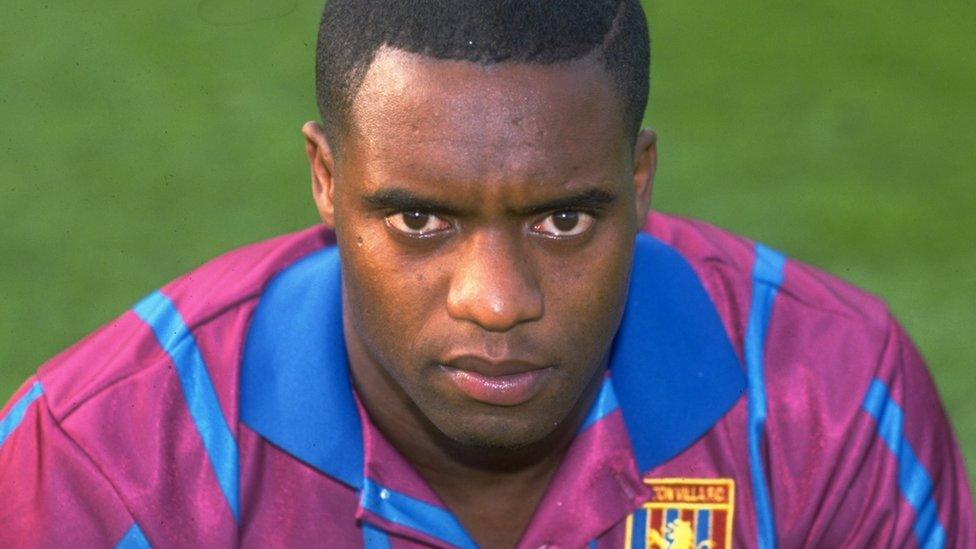Dalian Atkinson: Living at speed on and off the pitch
- Published
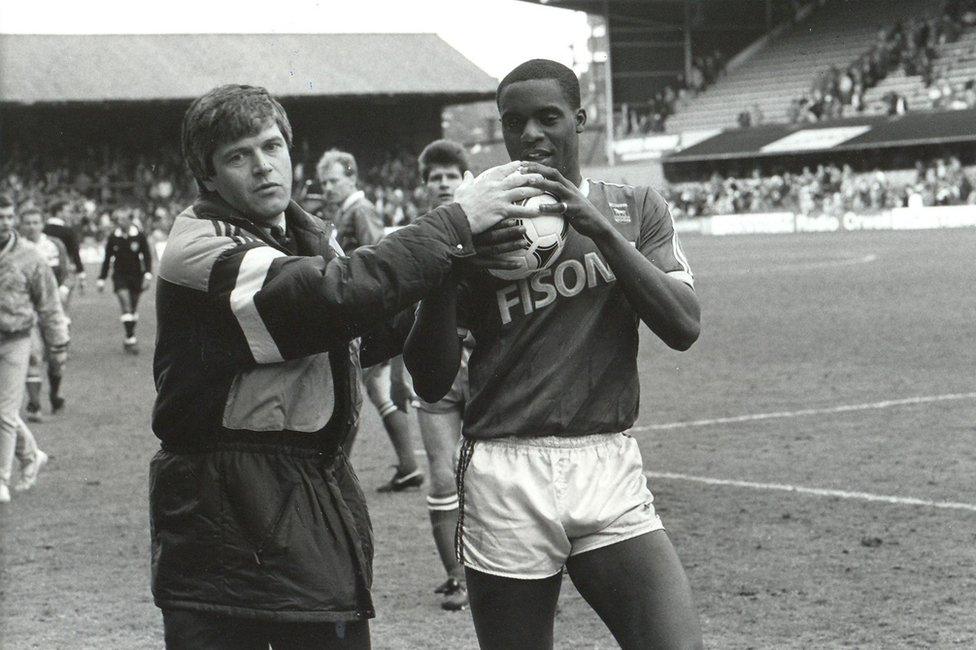
Dalian Atkinson after scoring a hat-trick for Ipswich Town against Middlesbrough in 1988
PC Benjamin Monk has been found guilty of the manslaughter of ex-footballer Dalian Atkinson, who died outside his father's home in Telford in 2016, aged 48. The striker had an illustrious career with clubs including Aston Villa and Sheffield Wednesday after starting out at Ipswich Town, where his time on and off the pitch is still fondly remembered.
"It was all about his blistering pace," said Jason Dozzell, a local boy who was already on Ipswich's books when the teenager first came to the club in 1983.
The 14-year-old Atkinson would travel along with other young talent from around the country to train at Portman Road during the school holidays.
This influx was a strange sight for Dozzell, who, like Atkinson, would go on to have a successful career.
Speaking to the BBC shortly after Atkinson's death, Dozzell recalled: "We had loads of people from up north come down in those days - lots from Newcastle.
"Their accents were intriguing; you couldn't understand them.
"Dalian was a bit like that. He had a little bit of a lisp when he talked - it was quite hard to understand."
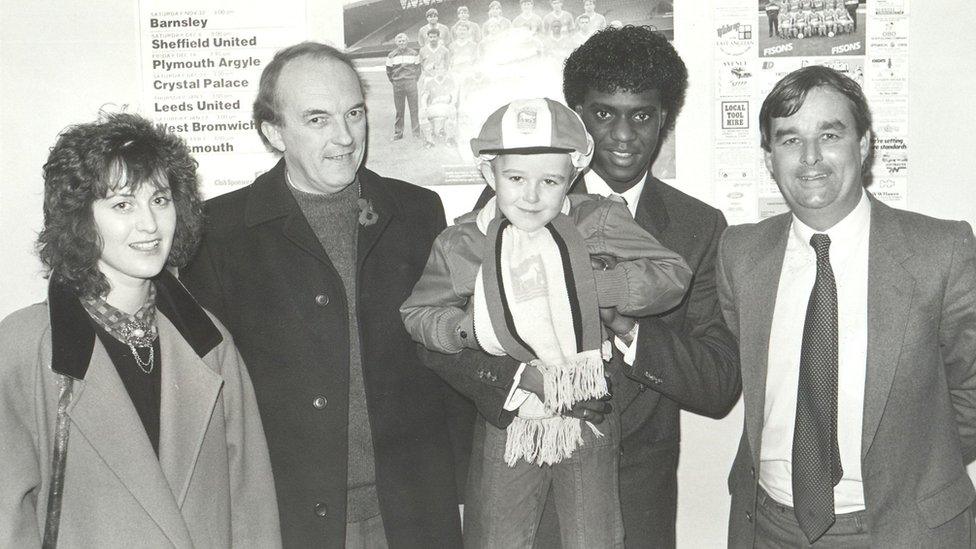
Atkinson's flair on the pitch made him a firm favourite with fans
Dozzell said that back then Atkinson, from Telford in Shropshire, was "very skinny" and would play as a right-winger - with exceptional pace.
"He made all my balls look good. You put it in front of him and he'd reach it," Dozzell said.
Memories of Ipswich's most successful era were quickly fading - they had won the FA Cup in 1978 and the Uefa Cup in 1981 - as the club tried to get used to life without Bobby Robson, who became England manager in 1982.
Atkinson and Dozzell were to be a key part of the club's revitalisation.
"We had a good understanding going after a while," Dozzell said. "I knew where he wanted it and he knew I was going to put it there - he was on his bike as soon as that ball came in to me."
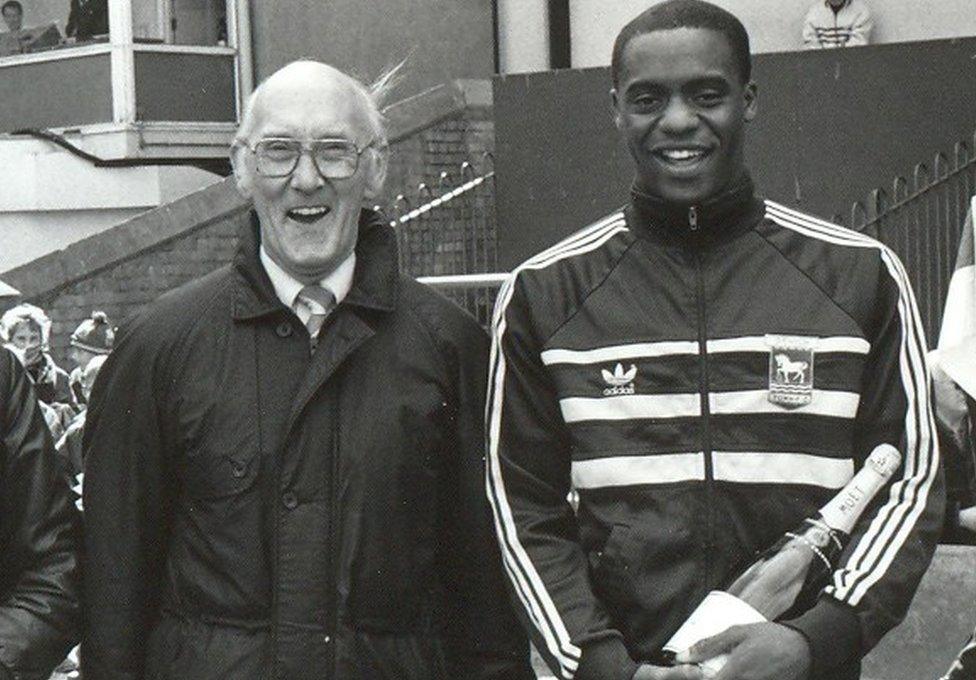
Atkinson, pictured with Jimmy Leadbetter, part of Ipswich's 1962 League-winning side, terrorised defenders with his pace and power
Along with Michael Cole, Dozzell and Atkinson were referred to in a newspaper report as "The Three Degrees" - the world of 1980s football was not renowned for political correctness.
Also speaking in 2016, fellow forward Cole remembered Atkinson as "raw, pacey, and unpredictable - in a good way" by the time they both became apprentices at Portman Road.
"Dalian was young, exuberant, fun to be around and had a raw talent - if and when he applied himself, he had an abundance of ability," Cole said.
After becoming apprentices, the two teenagers were put up with Maurice and Shirley Crawford, who lived a few miles out of Ipswich in the village of Bramford.
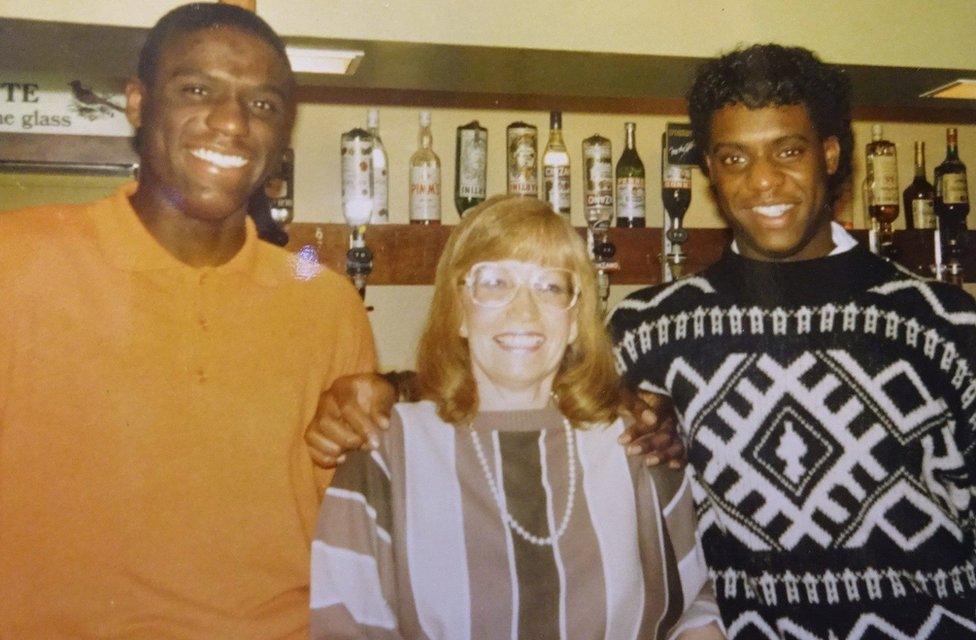
Michael Cole and Dalian Atkinson at Ipswich Town's bar with supporters' club member Pat Edwards
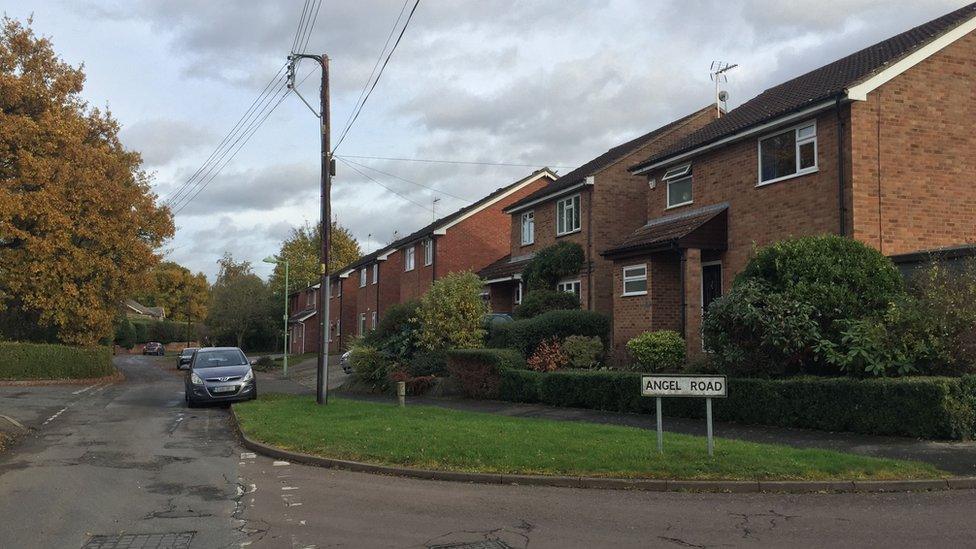
Cole and Atkinson were put up "out in the sticks" in Bramford, about three miles away from Ipswich
Mrs Crawford recalled how she had applied to the club to house a footballer, as it was a way of "earning good money", and ended up taking both Atkinson and Cole.
"I applied to have one footballer and when (the man from the club) came round to assess us, he said 'can you not put up another one?'" Mrs Crawford said.
"He said 'how do you feel about him being black?' I said it didn't bother me.
"He said 'well could you take another one?' There were a lot of people who wouldn't take them on. I said 'it's going to be a bit squashed, but he said 'oh, you could take two single beds in that room'."
Mrs Crawford has mostly fond memories of her lodgers, who were with her for about five years.
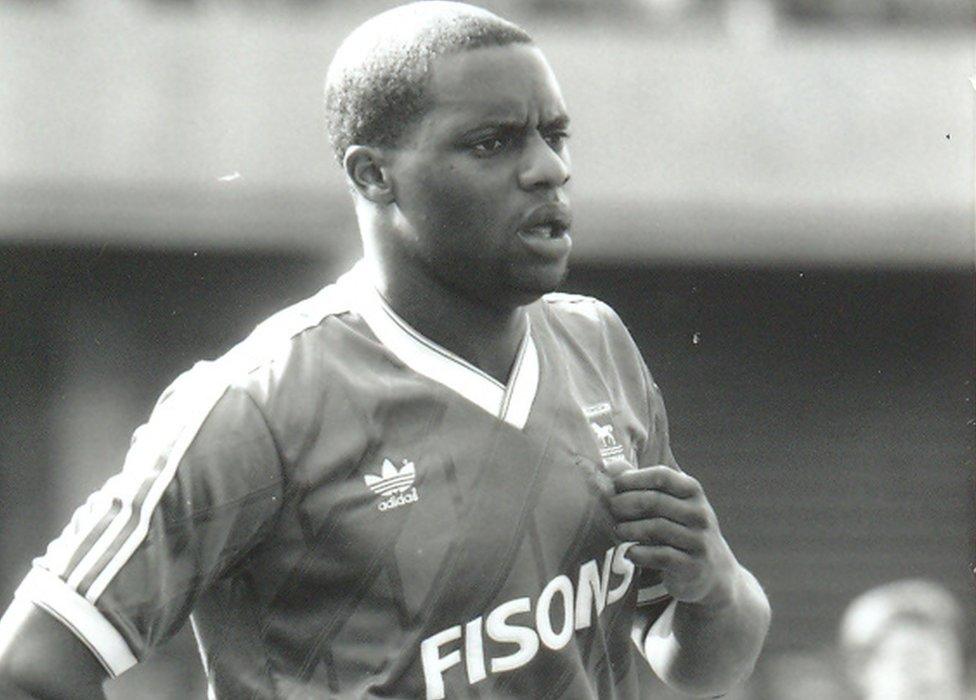
Atkinson scored 21 goals in 56 appearances for Ipswich
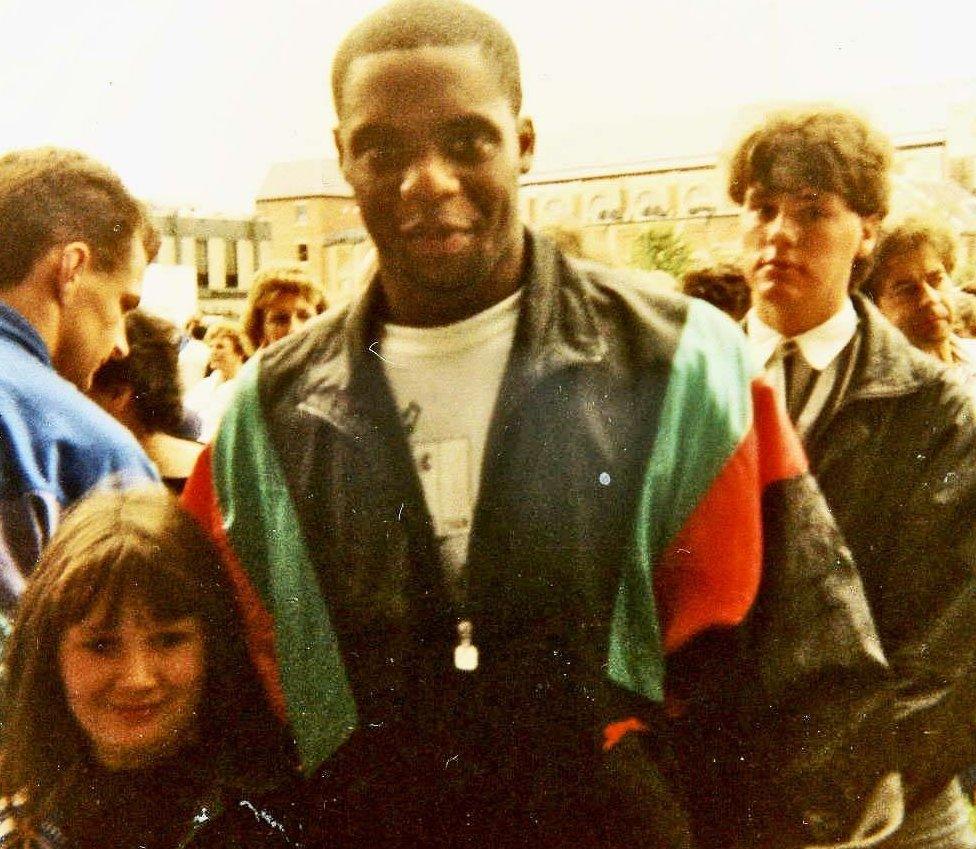
He became a cult figure among football fans and is best remembered for his time after leaving Ipswich
"They went through a stage - I think it was Dalian - where I'd go to the cupboard to get a biscuit and they were gone. We had to tighten up on that - 'you don't take, you ask'."
The fact that they had to be available for Boxing Day fixtures meant the pair would be with the Crawfords on Christmas Day.
"One year I had 26 people for Christmas dinner and I told them they had to come down and join in - they went up to their bedroom afterwards but they did join in. They were quite sociable.
"I looked after them how a mum would look after them. It was the first time they'd left home so I'd cook for them, wash for them, iron for them - did everything else for them."
Mrs Crawford's prevailing memory of Atkinson is of his love for the opposite sex.
"Dale, as we called him, liked the girls," she said. "He was on the phone every Friday evening. He must have got a book of girls' names and if he didn't get one girl he went right down the list."
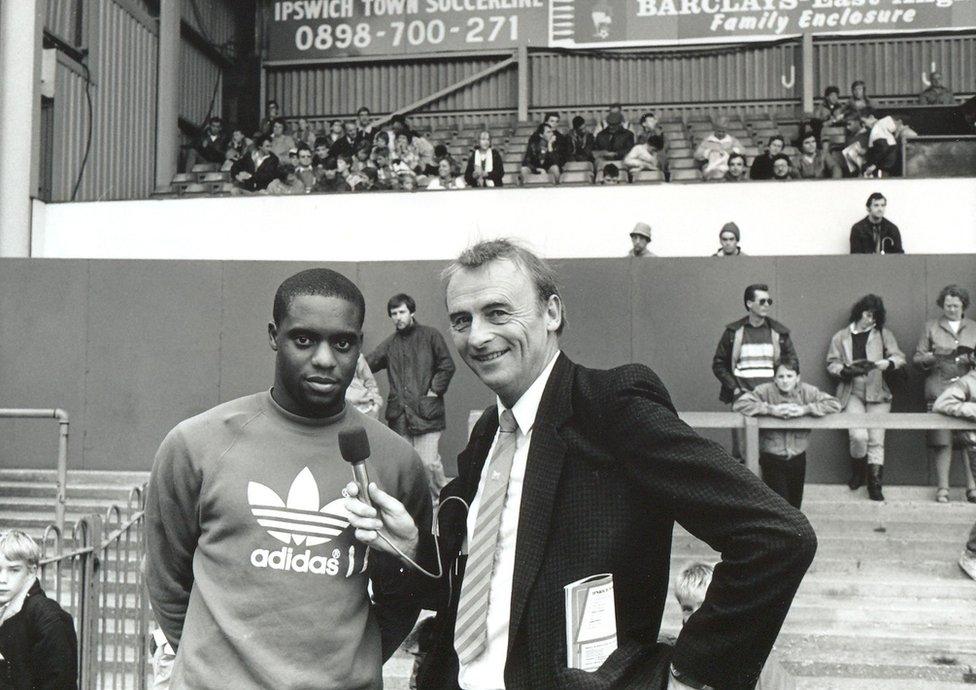
Dalian Atkinson being interviewed by BBC Radio Suffolk commentator Bryan Knights
Cole said he would always appreciate the time they spent together in Bramford.
"We were two young black kids, in an area that didn't have many black kids near us.... growing up together, enjoying playing football, wanting to progress.
"I don't think we would have made it through if we weren't there together. We helped each other get through the early stage."
Cole has similar memories to those of his old landlady about his room-mate's extra-curricular activities.
"As a young person, cars and the fairer sex were the way Dalian looked at things off the pitch," he said.
"He loved a fast car.
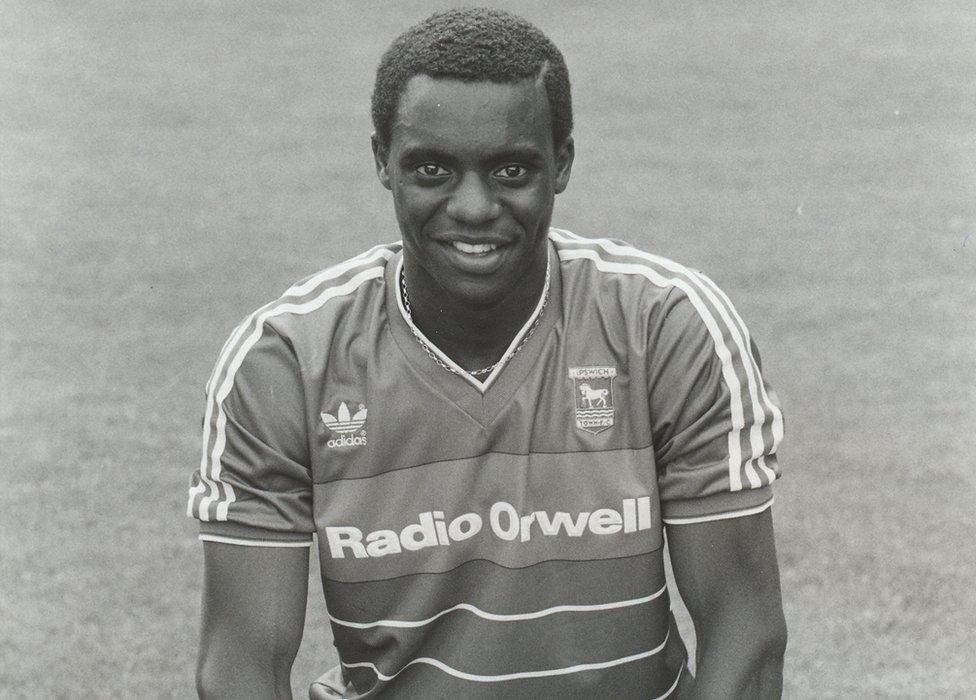
"One of the first cars he bought was an Alfasud. We went out to Woodford or somewhere and there was a mechanic working on this car, making additions. It became apparent to me it wasn't a normal road car - there were roll bars and it had a souped-up engine.
"We spent time with him going to places like Norwich on a weekend after a match, hanging on to dear life. It was like rally car driving - but he was a really good driver.
"It was like a reflection of how he was on the pitch - it was fast and pacey."
"He was an absolute lunatic driver," agreed Dozzell.
"He was good fun but you couldn't tell him anything to slow down - he'd just give you a look, 'be quiet'. Everything was fast. Everything was an experience when you were hanging around him."
By now, Atkinson was also beginning to have success on as well as off the pitch.
Having lacked power and confidence in the early stages of his career, he returned to Ipswich one summer for pre-season training with a beefed-up appearance.
"He'd been on a weight programme and had bulked up," Cole said. "He'd grown physically. Now he had not only the pace he had before, he now had power.
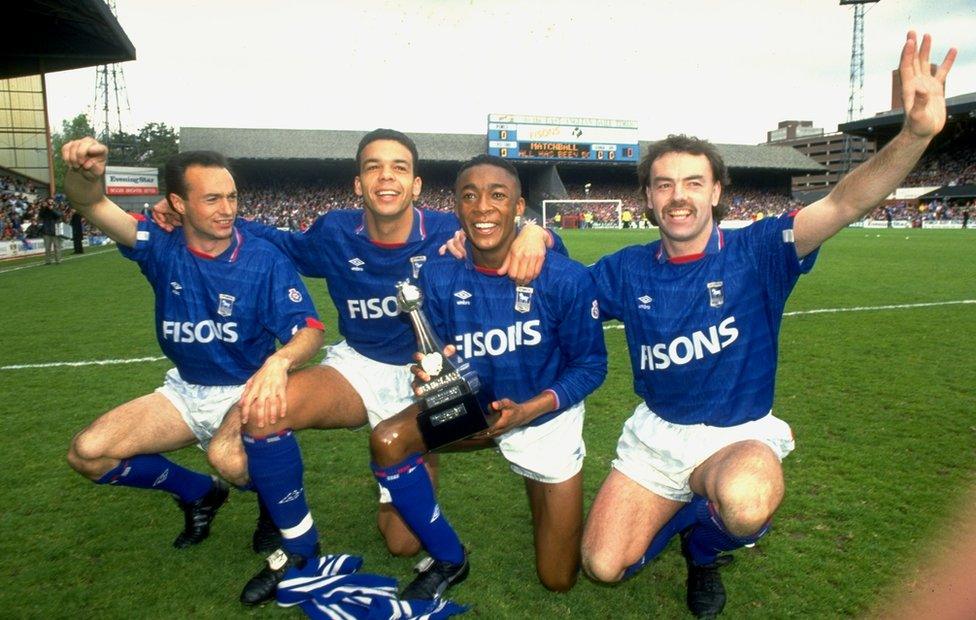
Ipswich won promotion three years after Atkinson left the club - with midfielder Dozzell, second from left, still a key player
"There was something about him when he came back - he had intent. He wanted to be on that team-sheet as a first-team player."
Atkinson made his first-team debut for Ipswich in March 1986, as a substitute in a 3-1 away defeat at Newcastle.
By this time Dozzell was already a regular starter.
"Dalian got so much abuse warming up, and in those days a lot of it was racial," he said. "He took so much stick he was thinking 'what's all this about?' But he came on and terrorised them."
As his success on the pitch led to better contracts, Atkinson was able to exert his independence.
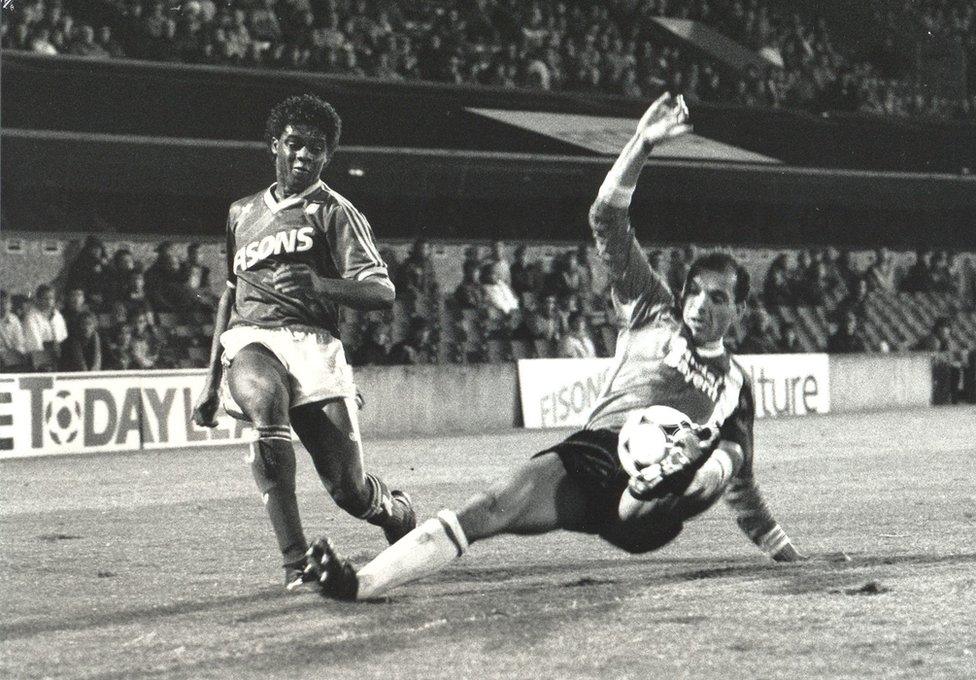
After Ipswich, Atkinson went on to play for clubs including Sheffield Wednesday, Aston Villa and Manchester City
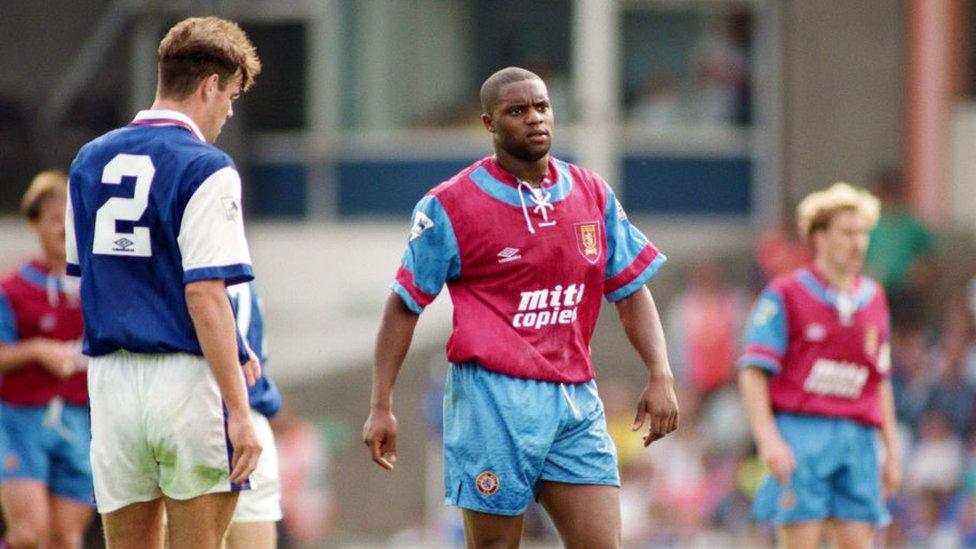
Dalian Atkinson scored against his former club in a 1-1 draw at Portman Road in 1992
Dozzell said his team-mate bought a house in Ipswich - but spent most of his free time out and about.
"He loved socialising, I'll give him that," said Dozzell. "I was always with him, so I can't say anything. We liked travelling as well - we used to go to Norwich, Romford, everywhere.
"There were no mobile phones or anything in those days to get you in trouble."
Atkinson left Ipswich in July 1989 to join top-flight Sheffield Wednesday.
"Ipswich were in the old Second Division and Sheffield Wednesday at the time were a big club," Dozzell said. "I was pleased for him. He felt he had to move on to progress, to a bigger club, and at the time Sheffield Wednesday were.
"I don't think he was a football supporter, someone who went to watch a team or anything. He just wanted to make it really quick at the best club he could."
He would go on to enjoy even greater success at Aston Villa, scoring in the final of the 1994 League Cup as the Birmingham club beat Manchester United - and of course netted that goal against Wimbledon, which was named the best strike of the 1992-93 season.
But his career would peter out in the late 1990s and Atkinson found it hard to adjust to life after football, something Dozzell can relate to.
"The money was decent, but it's not enough for when you come out of the game," he said.
"There are a lot of people in Dalian's position who you don't hear about - they don't talk to people.
"There was no-one to talk to in those days and it was a bit of an embarrassment you going to talk to someone if you thought you had any problems. I heard he was depressed. I've had hard times, coming out of the game, what the hell do you do?"
Dozzell said he was "devastated" about his friend's death.
"He's died on the street that he probably used to play football on as a kid," said Dozzell. "It's a tragic story. I'd heard he hadn't been well prior to this and hadn't got round to ringing him, which I'm disappointed in myself for.
"I'd heard he was quite ill, that he was in hospital. So I was disappointed in myself, and then this happens.
"We'd carry on where we'd left off the last time we saw each other, we didn't have to ring. That's just how we were.
"What's unfolded is tragic. He's the same age as me. It's so sad."

Dalian Atkinson: Career
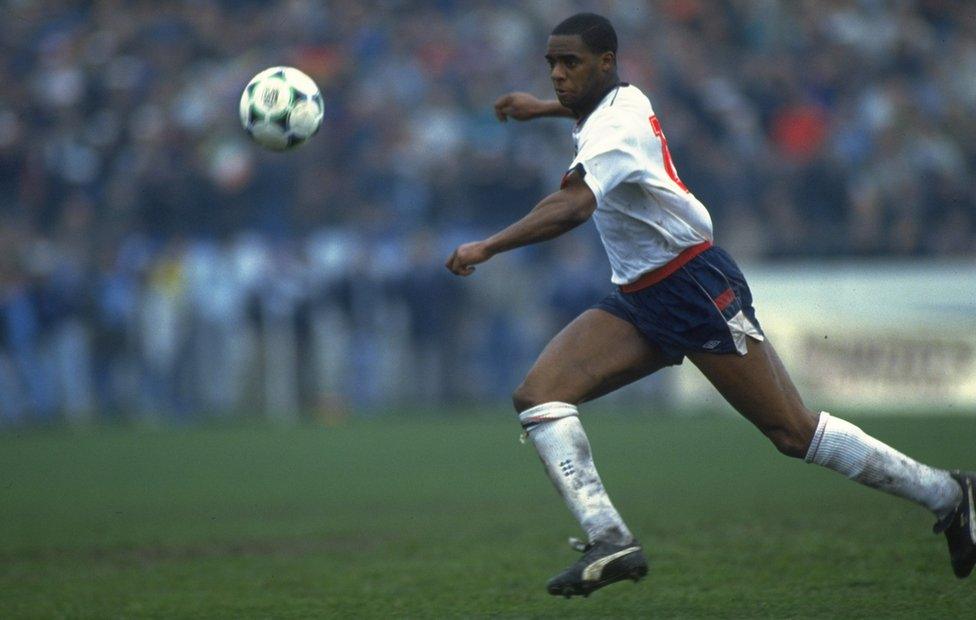
Dalian Atkinson started his footballing career as an apprentice with Ipswich
He signed for Ron Atkinson's Sheffield Wednesday for £450,000 in 1989
His sole international appearance was with the England B team in 1990, against Ireland
In August 1990 Atkinson moved to Spain, joining Real Sociedad for £1.7m
Ron Atkinson signed him for a second time in July 1991 - bringing him back to England to play for Aston Villa
His strike against Wimbledon was named the goal of the 1992-93 season
Atkinson joined Turkish side Fenerbahce in 1995, but failed to settle
He later played for Manchester City as well as clubs in Saudi Arabia and South Korea

This article has been updated since it was first published on 21 November 2016.
- Published23 June 2021
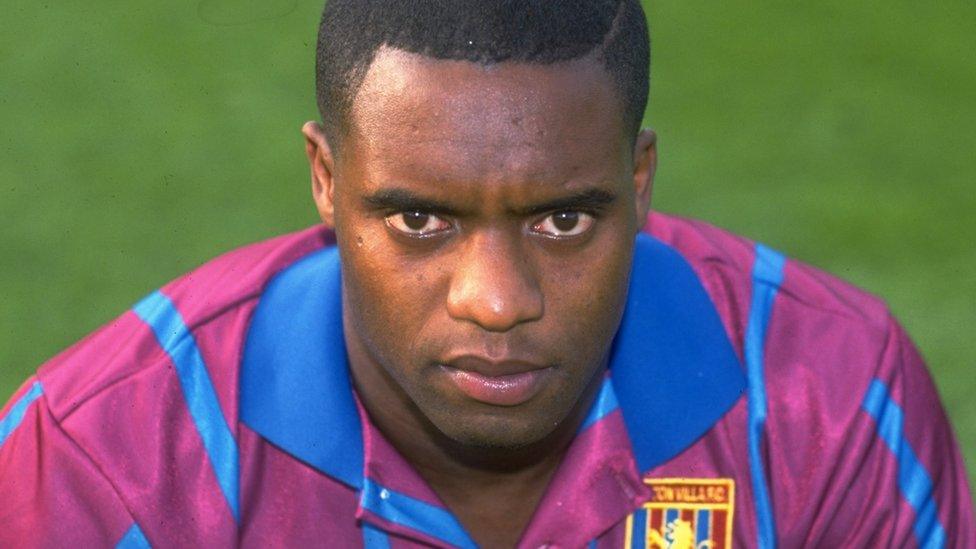
- Published18 November 2016
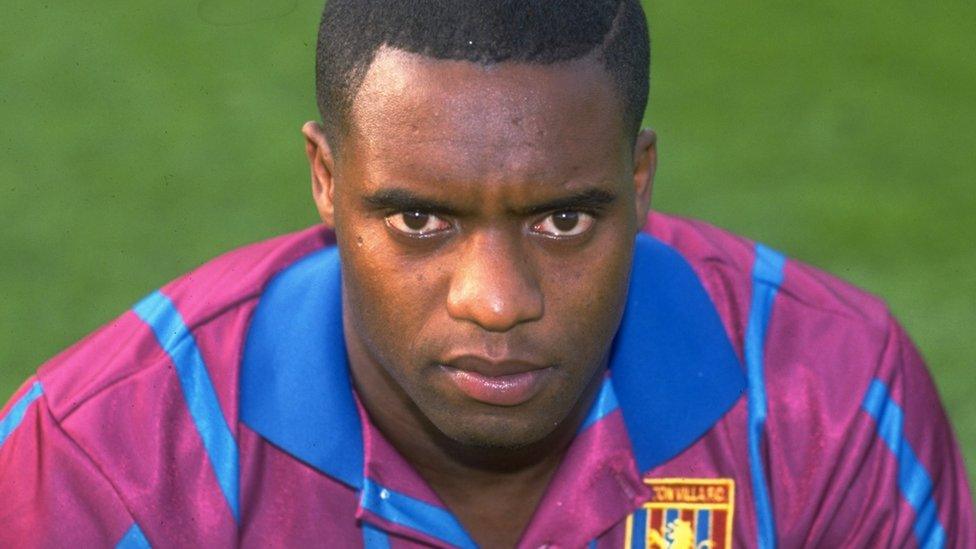
- Published15 August 2016
